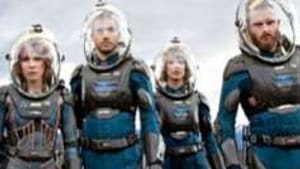Stay in the Loop
BSR publishes on a weekly schedule, with an email newsletter every Wednesday and Thursday morning. There’s no paywall, and subscribing is always free.
Ridley Scott phones it in
Ridley Scott's "Prometheus'

I could barely contain my excitement when I heard that Ridley Scott was making Prometheus, a prequel to the intelligent science-fiction franchise he launched with Alien in 1986. (Scott denied that the film is related to the Alien franchise, but having seen it I can safely say he was bluffing.)
The film's trailers were amazing, the viral online campaigns compelling, and the cast stellar: Michael Fassbender, Charlize Theron, Idris Elba and Noomi Rapace. And of course Scott himself is the British director whose atmospheric, detail-crammed style has characterized such diverse masterpieces as The Duellists, Blade Runner, Thelma and Louise and Gladiator.
What could possibly go wrong with such a project?
Everything, as it turns out. Prometheus feels like a cool idea for a movie whose details were artlessly thrown together the night before filming commenced.
From the moment the crew lands on the forbidding planet, with its towering and ominous structures, little in Prometheus makes sense. And not in a typical science fiction just-go-with-it way.
Expert scientists?
Glaring internal inconsistencies jump out at every turn: Characters' motivations are not only unclear to the audience but seem to change to fit the filmmaker's needs from scene to scene. New plot twists are developed and then quickly dropped. The crew of supposedly world-class scientists makes breathtakingly bad decisions that relate directly to the fields of their supposed world-class expertise.
Why, I wondered, did the creator aliens leave maps that show us how to get to a manifestly unfriendly locale? What's motivating the creepy android's wildly nonsensical behavior? Don't ask.
As for pithy dialogue: At one point, a human character debates with the expedition's android about her need to answer a Why Are We Here-type question. The android doesn't understand. "Well, I guess that's because I am a human, and you are a robot," she sighs.
How did such material get through the first round of edits? But it is too easy to blame the faults of Prometheus faults on co-writer Damon Lindelof, one of the creators of "Lost," a TV show known for introducing tantalizing plot threads and seemingly Big Ideas and then abandoning them. This movie is the brainchild of Ridley Scott, who has given long, thoughtful interviews about the film to an army of journalists and film critics. How did a critically acclaimed and auteur produce such a stinker?
Rowling and Clancy
I suspect the answer lies in what we might call Blumgart's Law, to wit: The more popular and successful an author or director, the less likely he is to encounter interference from editors or producers who might point out the lapses in his work.
Consider popular novelists like Stephen King, J.K. Rowling and Tom Clancy, whose books grew from reasonable-sized reads into gargantuan tomes as their audience and name recognition grew. (The book sales of one novel seem to directly correlate to the page count of the next one.) At one point, these authors grew so big and powerful, that publishers let their manuscripts through with the most cursory of edits. After all, the author's name will sell, no matter the quality of the final product.
Scott seems to suffer from a similar problem. A less prominent director wouldn't have been able to get away with this film's logical inconsistencies. Scott gets a free pass because, well, he's Ridley Scott.
I just hope Scott never makes the sequel to Blade Runner that he's been threatening. Or, if he does, that he hands the script off to somebody else.♦
To read a response, click here.
The film's trailers were amazing, the viral online campaigns compelling, and the cast stellar: Michael Fassbender, Charlize Theron, Idris Elba and Noomi Rapace. And of course Scott himself is the British director whose atmospheric, detail-crammed style has characterized such diverse masterpieces as The Duellists, Blade Runner, Thelma and Louise and Gladiator.
What could possibly go wrong with such a project?
Everything, as it turns out. Prometheus feels like a cool idea for a movie whose details were artlessly thrown together the night before filming commenced.
From the moment the crew lands on the forbidding planet, with its towering and ominous structures, little in Prometheus makes sense. And not in a typical science fiction just-go-with-it way.
Expert scientists?
Glaring internal inconsistencies jump out at every turn: Characters' motivations are not only unclear to the audience but seem to change to fit the filmmaker's needs from scene to scene. New plot twists are developed and then quickly dropped. The crew of supposedly world-class scientists makes breathtakingly bad decisions that relate directly to the fields of their supposed world-class expertise.
Why, I wondered, did the creator aliens leave maps that show us how to get to a manifestly unfriendly locale? What's motivating the creepy android's wildly nonsensical behavior? Don't ask.
As for pithy dialogue: At one point, a human character debates with the expedition's android about her need to answer a Why Are We Here-type question. The android doesn't understand. "Well, I guess that's because I am a human, and you are a robot," she sighs.
How did such material get through the first round of edits? But it is too easy to blame the faults of Prometheus faults on co-writer Damon Lindelof, one of the creators of "Lost," a TV show known for introducing tantalizing plot threads and seemingly Big Ideas and then abandoning them. This movie is the brainchild of Ridley Scott, who has given long, thoughtful interviews about the film to an army of journalists and film critics. How did a critically acclaimed and auteur produce such a stinker?
Rowling and Clancy
I suspect the answer lies in what we might call Blumgart's Law, to wit: The more popular and successful an author or director, the less likely he is to encounter interference from editors or producers who might point out the lapses in his work.
Consider popular novelists like Stephen King, J.K. Rowling and Tom Clancy, whose books grew from reasonable-sized reads into gargantuan tomes as their audience and name recognition grew. (The book sales of one novel seem to directly correlate to the page count of the next one.) At one point, these authors grew so big and powerful, that publishers let their manuscripts through with the most cursory of edits. After all, the author's name will sell, no matter the quality of the final product.
Scott seems to suffer from a similar problem. A less prominent director wouldn't have been able to get away with this film's logical inconsistencies. Scott gets a free pass because, well, he's Ridley Scott.
I just hope Scott never makes the sequel to Blade Runner that he's been threatening. Or, if he does, that he hands the script off to somebody else.♦
To read a response, click here.
What, When, Where
Prometheus. A film by Ridley Scott. For Philadelphia area show times, click here.
Sign up for our newsletter
All of the week's new articles, all in one place. Sign up for the free weekly BSR newsletters, and don't miss a conversation.
 Jake Blumgart
Jake Blumgart